Western Bhutan walking vacation
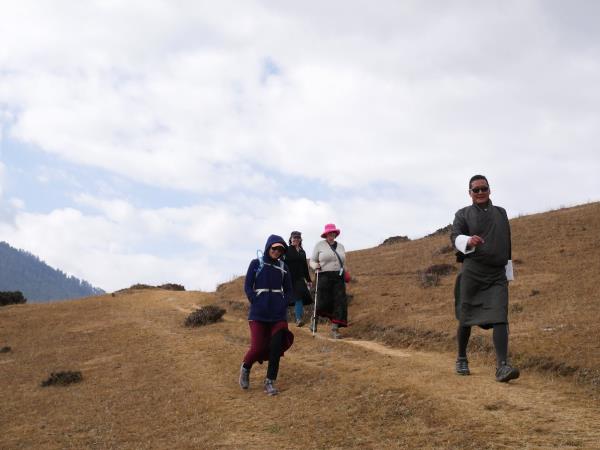
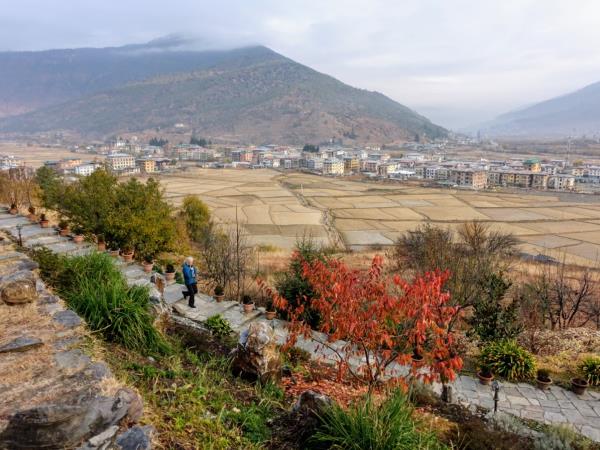
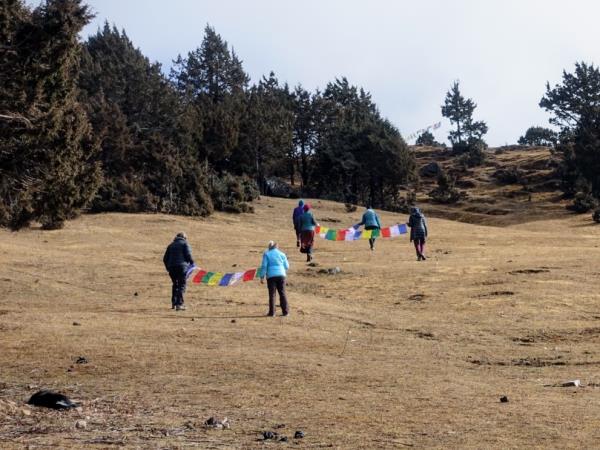
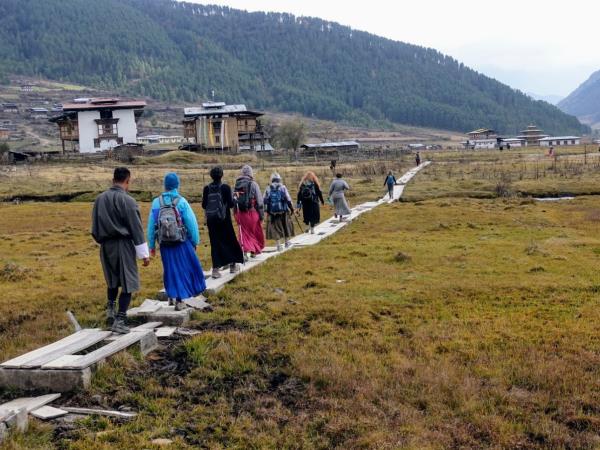
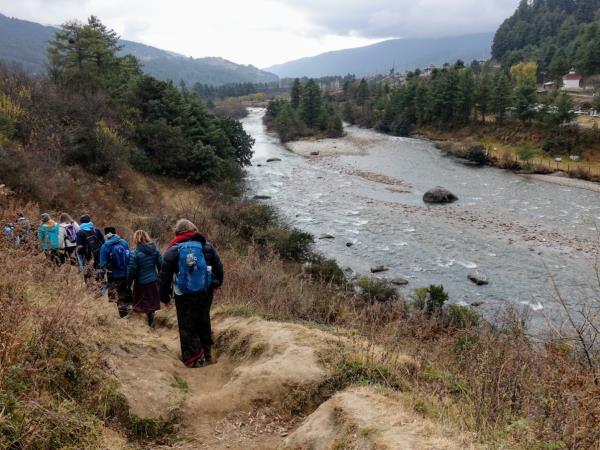
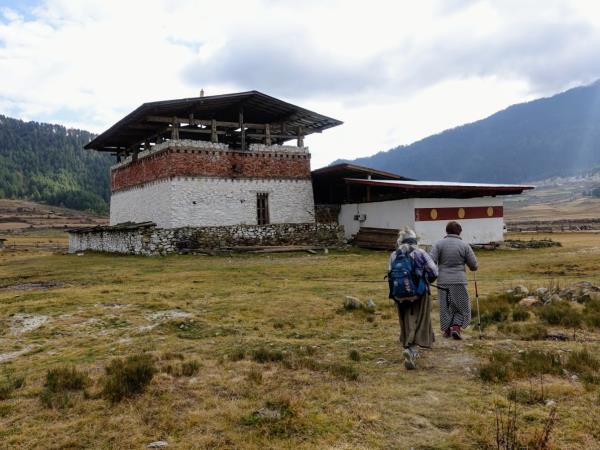
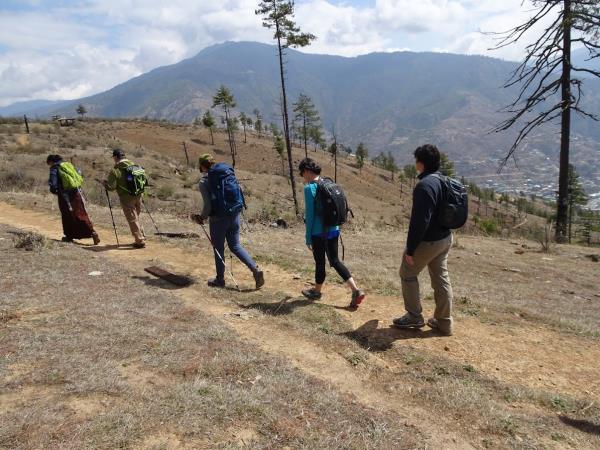
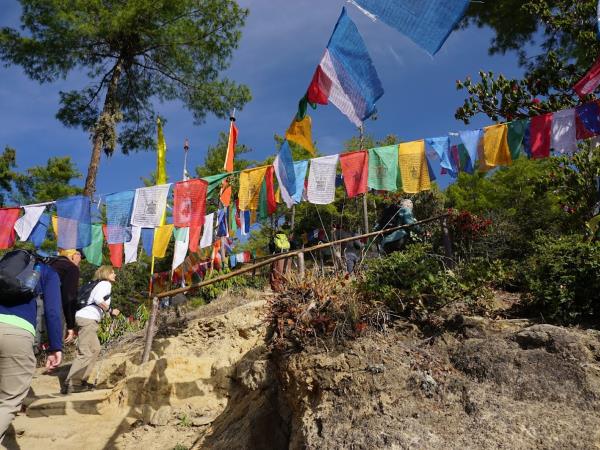
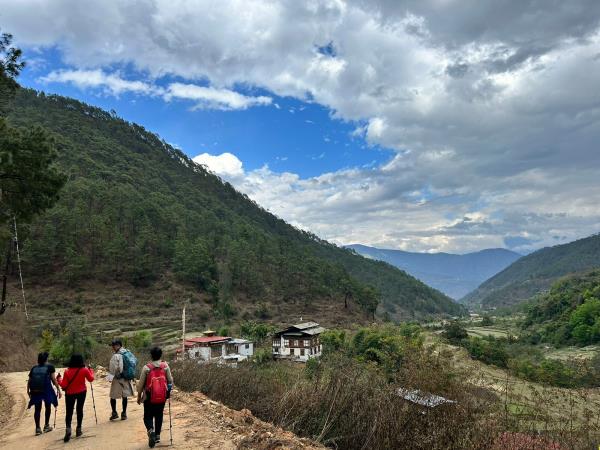
Western Bhutan walking vacation, tailor made to your abilities, and designed to explore the spirituality of this remote Himalayan kingdom and its stunning landscapes. Local guides accompany you as you explore beautiful protected areas, helping you understand the culture of a land still draped in mystery.
Paro Rinpung Dzong Thimphu Tango Monastery Punakha Chorten Nebu Walk Wangdiphodrang Taksang-Tiger’s Nest Climb
Price
US $1295ToUS $1850 excluding flights
More info
Inclusion Accommodation,All meals
All transfers, Forthcoming Local guide
Safe, competent driver, Visa and travel permit processing , Flight bookings.
Not included : Daily SDF taxes, Visa fees
Monument entry fees.
Description of Western Bhutan walking vacation
Price information
Departure information
This trip can be tailor made at a time to suit you and can be adapted to suit your interests, budget and requirements as necessary
Travel guides
Walks to monasteries, such as Tango, Cheri and Taktsang are an opportunity to exit city streets and embark on an adventure, where meetings with monks ...
Since opening its doors to tourists in 1974, this formerly isolated country has had a clear strategy about how to manage tourism and preserve the trad...
Vacation information
Top tip:
Many of the young monks at the Chorten Nebu Monastic School come from disadvantaged backgrounds. Your visit directly helps the monastery’s upkeep and funding with donations, but you can ask your tour operator about any specific items needed here that you might be able to bring from home.
Accomm:
All hotels are rated 3* to 5* and are inspected annually by the Tourism Council of Bhutan.
Solos:
Prices are based on twin sharing; single rooms may be available at a supplement.
Activity level:
Walking in Western Bhutan can be arranged according to your abilities and fitness level. Expect moderate to strenuous hikes, progressing as you go along. Foldable walking poles are recommended.
Meals:
All meals included (unless specified in itinerary).
Included:
All listed activities (unless specified in itinerary). Does not include visa fees or Sustainable Development Fee (USD$200 per night).
Dietary requirements:
Specific dietary requirements including vegetarian and vegan diets can be catered for; details will be requested when booking accommodation.
Reviews
4 Reviews of Western Bhutan walking vacation
5 out of 5 stars
Reviewed on 24 Apr 2023 by Catherine Morgan
We really enjoyed our vacation - we did some great hiking, visited a succession of amazing sites (and a festival) and found the accommodation and food to be of a high standard throughout. Read full reviewReviewed on 22 Apr 2023 by Jake Hewitt
Our time in Bhutan was great! I’d highly recommend this trip to anyone and everyone!! Read full reviewReviewed on 24 Nov 2019 by Susan McKenzie
The most memorable part of the vacation was Bhutan in general. It is a fascinating & beautiful country Read full reviewReviewed on 30 Mar 2019 by Cindy Fung
Loved it, it was a great experience and we were a bit sad to leave this wonderful country. For those who like hiking, this is a really nice hiking trip, not too strenuous and the trip was well-paced, we hiked every other day and had lots of time to relax in between Read full reviewResponsible Travel
As the pioneers of responsible tourism, we've screened this (and every) vacation so that you can travel knowing it will help support the places and people that you visit, and the planet. Read how below.
Planet
Our role in promoting Responsible Tourism is small but meaningful and adds much to the preservation and promotion of our country’s unique cultural heritage, environmental preservation, promotion of sustainable development and establishment of good governance which are the four main pillars of Gross National Happiness, the sole guiding development principle of our country.It is our aim that visitors will appreciate Bhutan through its living culture and pristine environment and the people of Bhutan will in turn benefit from their interaction with our visitors.
Our walking tour programs are popular and have always been environmentally friendly. Our hiking trails fall within the Jigme Dorji National Park, the second largest protected area in Bhutan. Park fees generated from our walking trails received from each individual person on the hike goes to the Nature Recreation and Eco-tourism Division for the Department of Forestry to help manage and implement several conservation and livelihood development initiatives within and around the park.
The vehicle used for transfer points will also transport food and equipment. We request for our guests understanding since in this way we can avoid using a separate car to transport food and equipment thereby reducing the gas used and the emissions from the vehicles.
We avoid using plastics that only have a short-term use. If plastic is necessary, like plastic bags to keep clothes dry in for example, we buy bags that can be used again, by the next tourist.
Whenever possible, we don’t buy any drinks in plastic bottles, opting instead for glass bottles or local paper packages. If buying plastic bottles can’t be avoided, we make sure the bottles are handed back to us for recycling and correct disposal.
We do not have a place to recycle batteries, therefore, we request our guests to take back batteries so that it can be recycled if the facility is available to them back home.
We prefer to boil and cool water for drinking rather than buying lots of plastic water bottles that will only increase the amount of waste.
People
We have a dedicated team of well trained and content local staff. Two guides, two drivers, one office manager, one office assistant, one cook and a camp assistant all of whom can perform their job at the office and in the field professionally and safely. We offer good salaries to our staff plus an exceptional new year bonus. All are staff have “personal accident insurance” against possible accidents at the office and in the field. We also have a Group Insurance scheme in place for staff medical/health emergencies. We have a retirement benefit scheme in the form of a Provident Fund account with the Royal Insurance corporation of Bhutan. We ensure that our staff our appropriately equipped for harsh weather conditions. We also make available a yearly clothing allowance because we require that everyone working on our tours is properly outfitted. Our guides and staff are the backbone of the organization and we could never run successful trips without their support.We support our local organic producers by purchasing as much food for our tours as possible from the Centennial Farmer’s market and local groceries. We also support local advocacy groups by donating time and money to their good causes, especially with programs related to youth development in the country.
Our guided tours follow strict cultural procedures. Our groups are briefed on suitable behavior prior to the tour departure. We want to preserve the culture of Bhutan that you've read about!
One example of our many community based and community led projects established through our walking tour programs –“Bhutan’s Beautiful Landscape and Cultural Heritage”
We oversee the project progress, do the book keeping, quarterly reports and project completion reports. We also met with the community and established the needs, sought for funds from our guest travelers and work in collaboration with generosity in action who control the funds and work directly with the donors. We also have project visits from philanthropic ventures. Their program officer visits Bhutan on audit the projects. When such a visit is required we arrange for a free visit and take care of the logistics.
Chorten Nebu Monastic School
The Monastery of Chorten Nebu, built in the eighteenth century is a little known treasure, with its magnificent statue of Maitreya (the future Buddha) and fine images of the great lamas of the Drukpa Lineage. According to legend, this magical spot was once a dense forest inhabited by evil spirits. One day, the Divine Madman, Drukpa Kunley arrived here when all the demons were gathered together in meeting. He hurled a blazing log into the gathering and all the evil spirits were scorched to death. The great oak tree outside the monastery is said to have grown out of the blazing log that the Divine Madman threw and interestingly, its bark is still dark, burnt down. People use the bark to bring them good-luck talisman.
In 2005 the Monastery started housing poor orphans from the nearby village and founded a small Buddhist educational institution for these little monks, a place where the children can study both traditional Buddhist scriptures and texts, and also learning Western subjects such as English, math and science in order to be equipped to survive in the modern world, whether as a monk or a lay person.
Sustainability Needs:
- Small renovations to the monastery - a national heritage.
- Clean water supply and proper drainage facilities (completed -2008).
- Construction of proper toilets/bathrooms(completed -2008).
- Construction of a dormitory and bedding supplies to the children (completed- 2009).
- A permanent kitchen for the school (ongoing 2011).
Projects Completed:
Guest Toilet - New outside flush toilet with sink built adjacent to the field used by guest trekkers
New water supply sourced on hill above monastery and piped to new Guest Toilet, to the Monastery, to the Kitchen, to the outside Water Spot, and to the previously built Toilet Block (6 toilets, 5 showers and sink, now finally usable!)
Lessons Learned:
1. Community needs assessment through community meetings is very important before launching such projects.
2. Participatory approach is necessary, and ultimately saved substantially on the cost.
3. It was discovered that guest trekkers camping behind the school property could use the new outside school toilet, so the Bhutanese trek assistants do not need to dig toilet holes in the surrounding areas as quick latrines therefore making the environment unhealthy and dirty. While a good clean toilet with running water is made available to the guests, the school can generate a modest income by way of a small fee collected from guests and trekkers using the facility. This provides the means to buy soap and other toiletry items for the children.
Factors that led to the success of the Project:
Immediate financial support from guest travelers through Generosity in Action (fund maintained at the Philanthropic Ventures Foundation) that provides a structure for travelers to support local villages and people. Coordination with tour operators and tour leaders insure that donations are properly applied to the projects intended.
Community participation:
The school monks and staff were able to identify and prioritize their need for safe drinking water and proper clean toilets above every other basic need.
Expected Outcomes:
- Sanitary behavior changes in the children.
- Practice good hygiene to help control the spread of infectious diseases.
- Access to clean drinking water to reduce disease and improve children health.
- Student monks practice proper hygienic behavior in the school and then take these behaviors home to their families.
- Community involvement teaches the local people about why we need a proper toilet system and encourages the local people to self finance, construct and use proper toilets to improve community health.
Immediate Challenges:
Awareness building on issues of Hygiene and Sanitation
Possible solutions identified and implemented such as:
a) Hand washing with soap before meals and after visiting the toilets.
b) Keeping the environment clean, by stopping use of bushes as quick latrines.
Long Term Challenge:
The children to act as special agents of behavioral change in the community.
Carrying the initiative forward……
A permanent dormitory for the children.
To support the head lama and adult monks in maintaining discipline over the 25 young monks who slept in several separate small spaces in two buildings, it was requested that a room be renovated and supplied to allow all student monks to be housed in one room.
- 25 beds have been bought for our boys.
- New linen & pillows & blankets have been supplied.
- The rotten wooden planks have been removed and replaced by concrete.
- Metal cabinets have been installed in the dormitory.
We also have a program designed to offer education for girls in far reaching villages in Bhutan. A program simply called Girls Too.
Popular similar vacations
Bhutan trekking vacation, tailor made
From US $3250 - US $3750 14 days excluding flights
Trek through gorges and valleys offering spectacular views of the Sacred Summits of Bhutan
Snowman trek in Bhutan
From US $12490 27 days excluding flights
The ultimate Bhutan trekking experience
Bhutan vacation, Land of the thunder dragon
From US $7560 - US $8960 12 days excluding flights
A spectacular trek combined with cultural highlights










